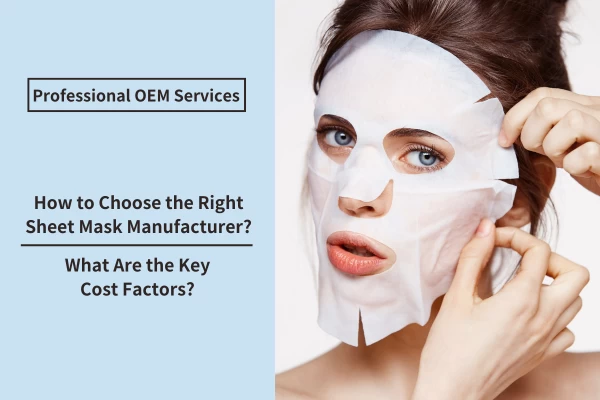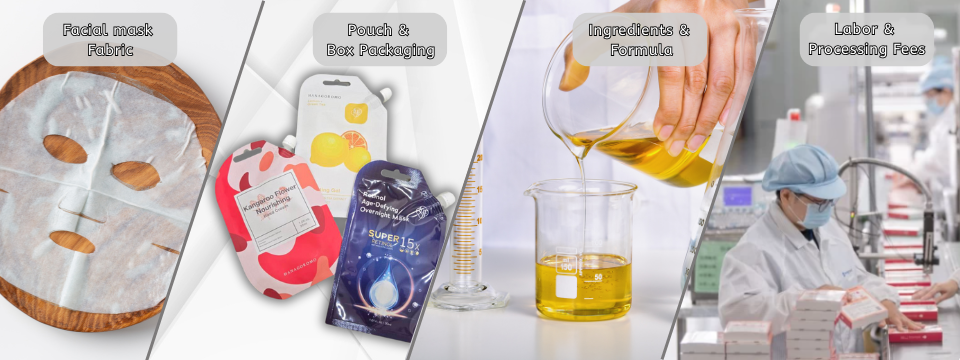How to Choose the Right Sheet Mask Manufacturer? Breaking Down the Key Cost Factors!

2025/04/11
From packaging and mask fabrics to serum formulas—here’s everything you need to know!
Sheet masks are a popular skincare product that many beauty brands include in their lineup. Whether your product focuses on hydration, brightening, anti-aging, or soothing, choosing the right manufacturing partner is key to quality and efficiency. But before jumping into production, it's important to understand two things: what makes up the cost of a sheet mask, and how do you find a trustworthy OEM/ODM partner?
Here’s a clear guide to help you get started, even if you're new to the industry.
1. Market Trends in Sheet Mask Manufacturing
As the skincare market evolves, sheet masks have become more than just a hydration product. Some key trends include:
- Multifunctional formulas: Masks with brightening, anti-aging, calming, or oil-control features are becoming more common.
- Clean beauty standards: More brands are focusing on alcohol-free, fragrance-free, and preservative-conscious formulas.
- Sustainable packaging: Eco-friendly options like biodegradable mask sheets and recyclable pouches are gaining attention.
- Small-batch production: New and niche brands prefer smaller orders with high flexibility. ODM customization is increasingly in demand.

2. Cost Breakdown: What Makes Up a Sheet Mask's Price?
When discussing quotes with a manufacturer, you’ll often ask: "What contributes to the cost of each sheet mask?" Here's a breakdown of the main factors:
a. Mask Fabric
The type of fabric affects how the serum is absorbed and how the mask feels on the skin. Common options include:
- Tencel: Soft, skin-friendly, and biodegradable
- Cupra: Very clingy and high-end feel, slightly more expensive
- Bio-cellulose: Gel-like and luxurious, often used in premium products
- Charcoal or mesh fabrics: Designed for oil control or deep cleansing
► Tip: The cost difference between fabrics can be up to NT$1 per piece.
b. Pouch and Box Packaging
Packaging plays a big role in both cost and visual appeal. For pouches, you can choose from glossy, matte, or white aluminum. Each has different price points and looks. Printing options (single-color, full-color, metallic ink), shape (rounded corners, easy-tear edges), and extras like embossing or sealing layers will all impact pricing.
If you also need an outer box, the cost will depend on the paper weight, number of colors, gold stamping, UV finish, window cutouts, or inner tray design.
c. Serum Ingredients & Formula
The serum is the heart of a sheet mask. Prices vary based on the ingredients, their concentration, and the complexity of the formula. Common active ingredients like hyaluronic acid, centella asiatica, ceramides, and peptides will change the price depending on purity and dosage.
Most manufacturers offer two paths: ready-made formulas (lower cost) or fully customized formulations (price based on raw material quotes).
d. Labor & Processing Fees
Filling, sealing, labeling, and quality control are labor-intensive steps that also add to the cost. For small orders, these costs can have a larger impact per unit, since labor and machine setup time remain the same regardless of quantity.
3. What to Look For in a Professional Sheet Mask OEM/ODM Partner
Price isn’t everything. A reliable manufacturer should meet these important standards:
- Certifications: ISO, GMP, or international quality certifications show that the facility follows strict standards for hygiene and safety.
- In-house R&D support: A manufacturer with a strong R&D team can help you adjust ingredients, improve formulas, and create something unique for your brand.
- Packaging options & design support: A wide variety of packaging and design services help create a product that stands out.
- Export experience: If you plan to sell internationally, choose a partner familiar with shipping, customs, and certifications across markets.
- Clear quality control & after-sales service: Good manufacturers provide reliable inspection processes and clear communication during and after production.
Choosing the right partner will help your brand save time, reduce risk, and avoid common issues like delays or miscommunication.
Update: 2025-04-11